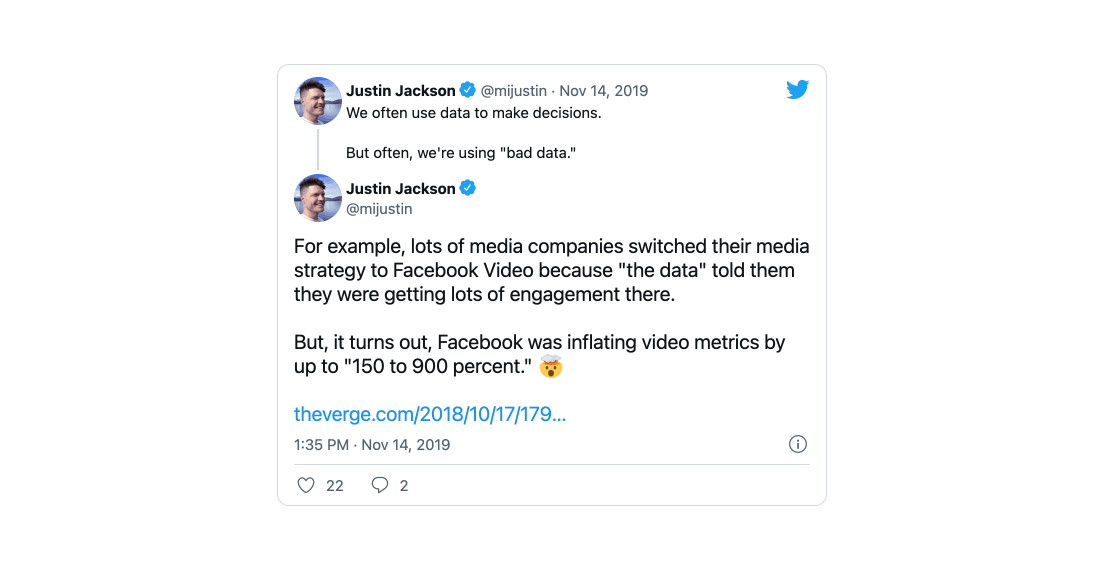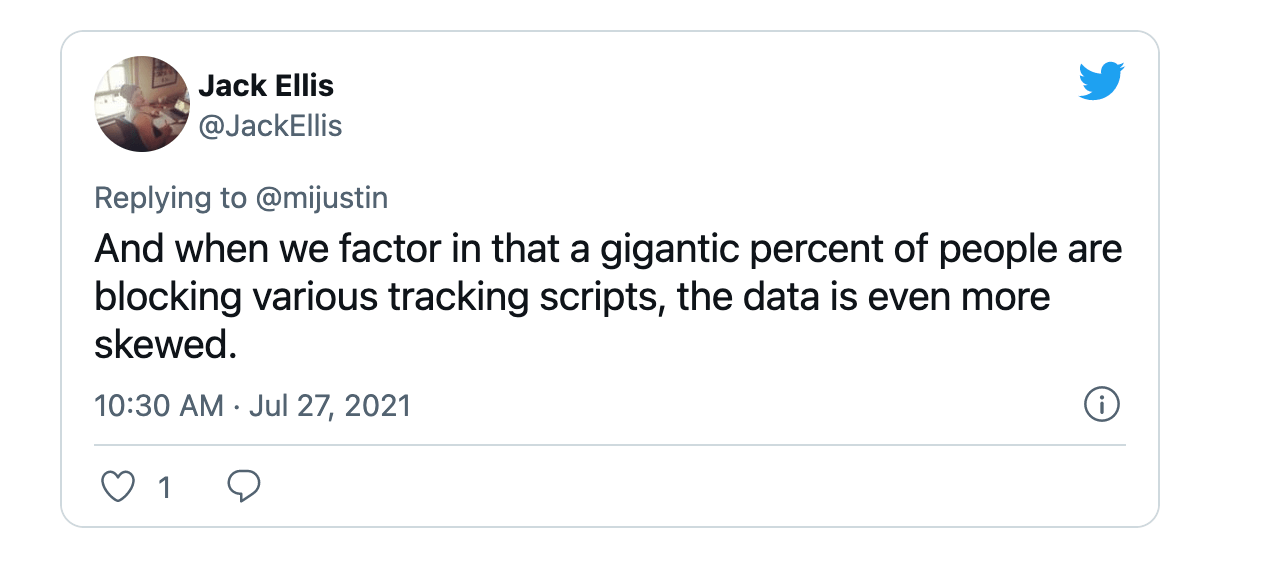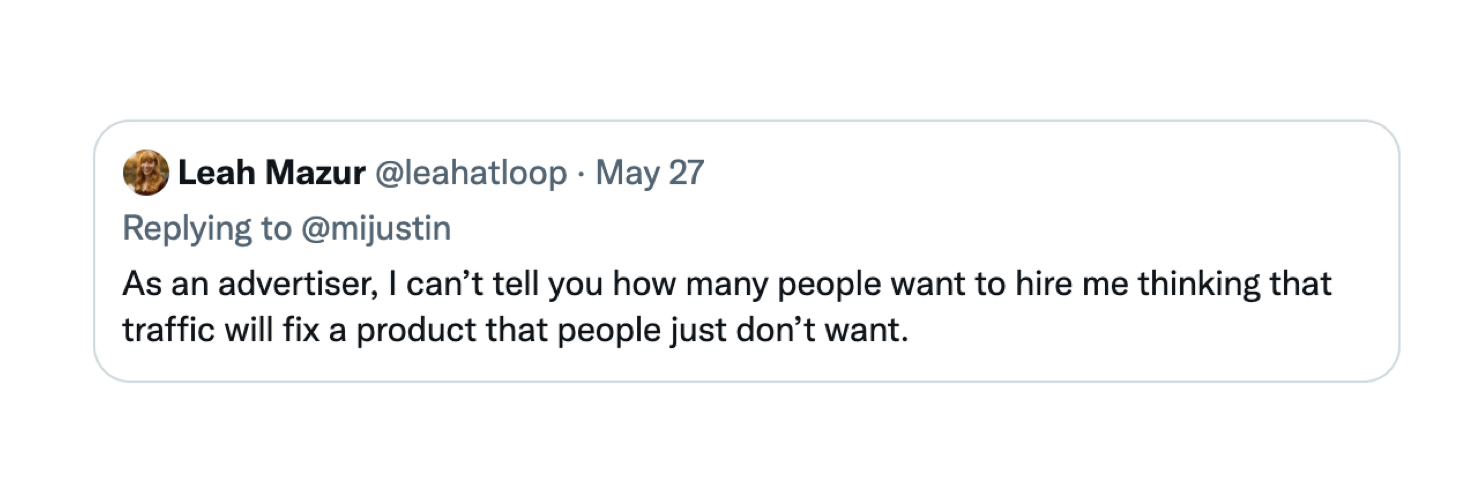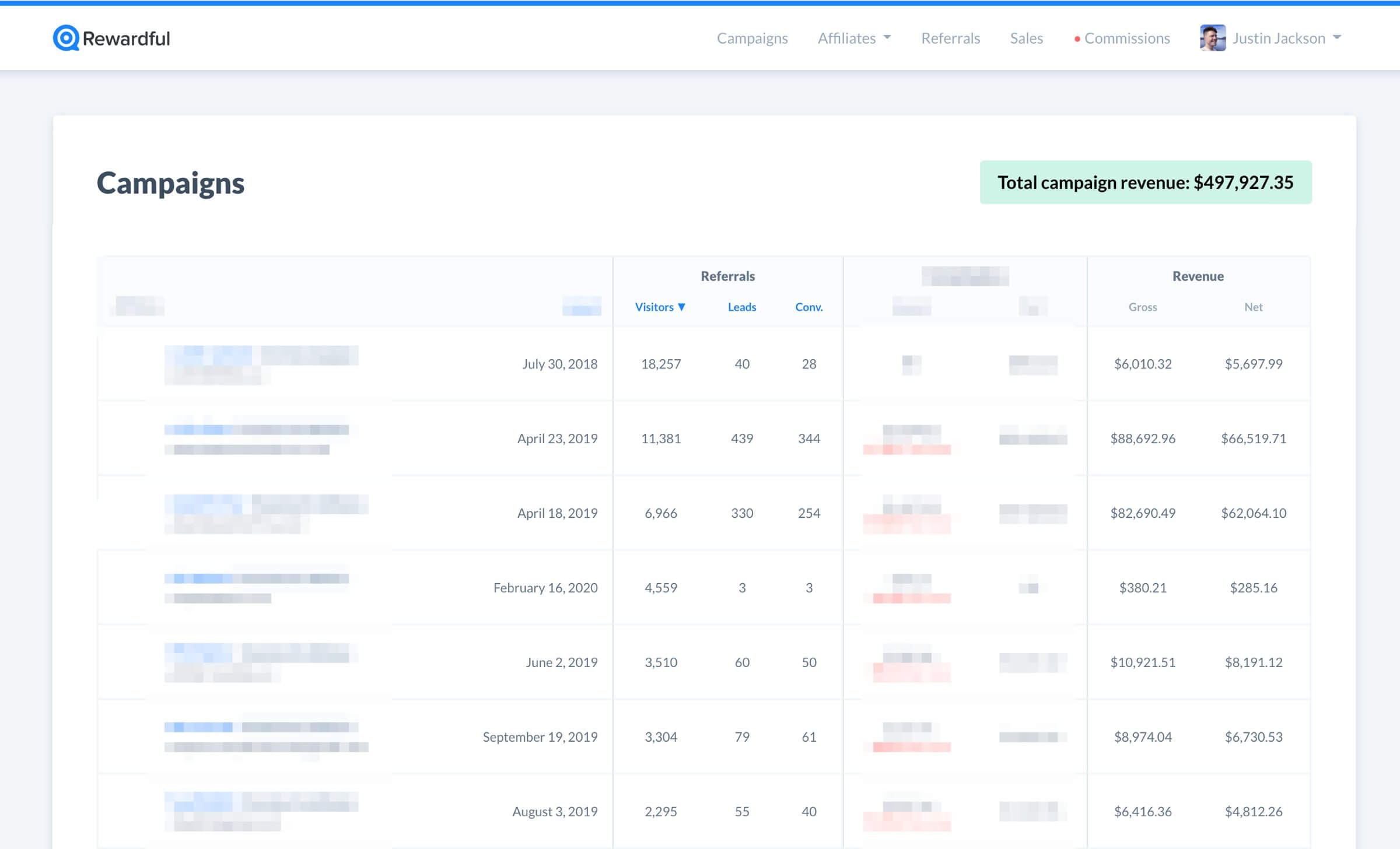Do you need marketing tracking and automation?
I used to invest heavily in marketing automation, tracking, attribution, configuring funnels, and retargeting. But after 13 years of doing marketing for SaaS companies... I'm convinced that 90% of it is unnecessary.
The biggest reason you don't need a complex marketing stack?
What drives demand isn't a bunch of funnels or retargeting campaigns...
What really drives demand is a bunch of customers who actively want what you're selling.
The purpose of marketing is to connect buyers (who want a product like yours) with your product.
From what I've seen, there's a certain type of product that requires MORE marketing; more convincing, more funnels, more drip campaigns, more manipulation. These aren't the type of products you should be building.
For indie entrepreneurs, the best products to build are the products people already want to buy. It shouldn't take a bunch of effort to convince them.
Do we really need marketing tracking?
Marketing attribution tools require a ton of investment to get right.
(Most often, they're incorrectly configured)
"Growth programs are really easy to screw up. Multiple times in my career, I’ve had to throw out 3–6 months worth of tests." – Lars Lofgren
I wouldn’t be surprised if most company’s analytics and funnels are incorrectly configured.
Companies are making big decisions based on faulty data. (It’s happened to me multiple times)
Also, many of the metrics we’re getting from Google, FB, etc are inflated.
In private, most marketing professionals will admit that much of the data we collect is "dirty." (Not accurate) The repercussions of making decisions based on faulty data are big!
"Visitor → trial" is an important KPI on many marketing teams. But with so many people blocking tracking scripts, how is that number useful at all? Even Google Analytics can't keep up with all the spam bots screwing up their data.
And, as Lars Lofgren explains, after a certain point, investing in tracking, testing, and automation gives you diminishing returns. Like squeezing juice from a squeezed lemon.
"Growth marketing" burns out categories
We've now see the scorching effect of growth marketing in multiple categories now. When everyone puts their marketing on steroids, it burns out the customer.
Hillary Weiss articulated this strongly, back in 2017:
Strategies that used to be gold standard “cash faucets” are drying up. This is largely because, as one of my fellow writers so succinctly put it:my niche is marketing “on steroids”. You’re constantly inundated with affiliate programs, opt-in gifts, funnels, Facebook group invites, ads, retargeting campaigns, webinars, challenges, master classes, and emails, emails, emails day in, day out.
What does work?
Here's the simple marketing approach we use at Transistor.fm. I'm not saying it will work for everyone, but it's worked for us, and might work for you too:
- Have a product that people are searching for ("best podcast hosting").
- Get traffic from SEO, affiliates, content, and optimize for folks signing up on our homepage.
- Ask for credit card up-front, and give a 14-day free trial.
- Track revenue earned from affiliates and other promotions using Rewardful.
- When people sign up, send an automated email asking them how they found us.
Have a product that people are searching for
Your aim is to to build a product in a category where people are already searching for a solution. If there's no underlying customer demand, all your subsequent marketing efforts will be wasted.
The purpose of marketing is to take the existing momentum of customer demand, and direct it towards your product.
How to get traffic from SEO, content, affiliates
The benefit of having a product people are already looking for? A short funnel.
When people already want what you have, you don't have to spend a bunch of time educating them, convincing them, retargeting them, etc.
Instead, you're meeting them where they're at: they want a product like yours, you just have to let them know you exist!
Here's what the "customer journey" looks like at Transistor:
- Someone decides they want to podcast.
- They learn they need podcast hosting.
- They search "best podcast hosting."
- They find Transistor, visit our homepage.
- They sign-up for a trial (with their credit card).
- They become a customer.
To increase the odds that somebody will find Transistor, we have four main avenues:
- Content: blog posts, guides, YouTube videos, Reddit posts, tweets.
- SEO: we optimize our content for search using tools like ahrefs.com.
- Affiliates: we partner with folks who have built up high-traffic sites in our niche.
- Word of mouth referrals: a combination of good product + good service + good community outreach makes it more likely that folks will refer you when given the chance.
For tracking page-views, and which content is the most popular, we use Fathom Analytics.
Ask for credit card up-front, and give a 14-day free trial
One thing that really simplifies our marketing at Transistor is asking for a credit card up-front.
We might be able to earn more money if we didn't require a credit card, but it makes tracking conversion rates a lot simpler.
The general rules of thumb for conversion rates in SaaS are:
Credit card upfront:
- Visitor to trial: 0.75% - 1%
- Trial to paid: 40% - 60%
No credit card upfront:
- Visitor to trial: 5%+
- Trial to paid: 8% - 20%
As I mentioned before, I'm highly skeptical of most "visitor to trial" conversion rates. Trials are easy enough to count, but visitor counts are impacted by bots, spam, ad blockers, people logging in, and folks landing on your website by mistake.
At Transistor, I'm only tracking two numbers here:
- How many trials do we get each month?
- What's our trial to paid conversion rate?
Our trial to paid conversion rate is remarkably steady at 75%, so our primary lever for increasing revenue is getting more trials.
How do we know where trials are coming from?
When people sign up, we ask them how they found us
We use Userlist to send trial customers an email when they sign up. In that email, we ask:
What's happening in your world that brought you to Transistor?
This gives me a sense of what caused them to look for podcast hosting. I then reply to these folks individually, and ask:
Do you remember how you found us? (Or how you heard about us?)
These answers help me understand how people discovered Transistor. The best part? I don't need any analytics to learn this information; I just have to ask.
Instead of "last-click attribution," I get a full picture of how the customer first heard about us, and what lead them to sign up.
The only tracking we do is in Rewardful
We initially started using Rewardful to manage our affiliate program.
I like it because it integrates directly to Stripe. When an affiliate refers someone to us, it's immediately recorded in Stripe. Once they convert to paid, Rewardful tracks how much gross revenue that particular affiliate has brought us.
But soon, I realized I could use Rewardful as an easy way to track individual campaigns. For example, whenever I post a YouTube video, I'll link to Transistor in the description using https://transistor.fm/?via=youtube.
I haven't done a lot of ad campaigns, but when I do, I'll create a new campaign link in Rewardful:
When people click on a campaign link, I can see how many folks converted to leads, and how many ended up being paying customers.
Focus on the main thing
Jason Cohen has a great article called “The one important thing for startups." In it, he says:
At a little company, increasing conversion rates from 0.9% to 1.1% doesn’t matter if only 100 people come to the website every day. Much more important is getting 1,000 people to come to the website every day.
Too often, in startup marketing, I see companies investing in complicated marketing stacks, that don't produce results. Instead of focusing on "all the things" (retargeting, attribution, tracking) focus on the one thing that matters.
For Transistor, the "one thing" is new trials. If we're increasing trials, everything else takes care of itself.
I realize this won't work for every startup, but my intuition is that it's actually the right focus for most indie SaaS companies.
Keep your approach simple, and move the needle.
Cheers,
Justin Jackson
Co-founder, Transistor.fm
@mijustin



